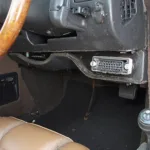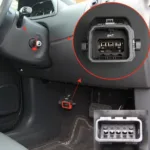OBD2 scanners can sometimes detect AC problems, but their capabilities are primarily focused on the engine and emissions systems. Whether or not an OBD2 scanner can pinpoint your specific AC issue depends on the nature of the problem and how it interacts with the car’s computer system. Let’s dive into the details of how these diagnostic tools work with your car’s AC system.
How OBD2 Scanners Work and Their Limitations with AC Systems
OBD2 scanners are designed to read diagnostic trouble codes (DTCs) generated by the car’s onboard computer. These codes relate to various systems, primarily focusing on the engine and emissions. While some AC problems can trigger DTCs that an OBD2 scanner can pick up, others might not be directly linked to the car’s computer and therefore won’t show up. Think of it like this: the OBD2 scanner is excellent at reading the car’s central nervous system, but the AC system, while connected, sometimes operates more independently.
When OBD2 Scanners Can Detect AC Problems
There are specific situations where an OBD2 scanner can be helpful in diagnosing AC issues. These typically involve electrical or sensor problems that affect the AC system’s communication with the car’s computer. For instance:
- Faulty AC Pressure Sensor: If the pressure sensor malfunctions, it can trigger a DTC that an OBD2 scanner can detect.
- Electrical Issues: Problems with wiring, fuses, or the AC control module can sometimes generate codes readable by a scanner.
- Engine Performance Issues Affecting AC: Sometimes, engine problems, such as low RPM, which an OBD2 scanner can easily diagnose, can also impact the AC’s performance.
When OBD2 Scanners Can’t Detect AC Problems
Many AC problems are mechanical in nature, and these often won’t trigger any codes detectable by an OBD2 scanner. Here are some examples:
- Refrigerant Leaks: A common AC issue, refrigerant leaks are impossible for an OBD2 scanner to pinpoint directly.
- Mechanical Compressor Failure: While a severe compressor failure might indirectly affect other systems and trigger a code, the OBD2 scanner won’t identify the compressor itself as the culprit.
- Blocked or Damaged AC Lines: These physical obstructions won’t generate any codes readable by a standard OBD2 scanner.
Can OBD2 Scanners Detect Low Refrigerant?
This is a common question, and the answer is generally no. OBD2 scanners can’t directly detect low refrigerant. While some newer cars have more sophisticated systems that might indirectly flag low refrigerant levels through pressure sensor readings, this isn’t a standard feature across all vehicles.
Using an OBD2 Scanner for AC Diagnostics
Even though an OBD2 scanner might not always pinpoint the exact AC problem, it can still be a valuable tool in the diagnostic process. It can rule out or confirm certain electrical or sensor-related issues, which can help narrow down the potential causes.
“A good OBD2 scanner can be a helpful starting point when troubleshooting AC issues,” says automotive expert, Michael Carter, ASE Certified Master Technician. “While it might not provide a complete diagnosis, it can offer valuable clues and save you time and money by pointing you in the right direction.”
Beyond the OBD2 Scanner: Further AC Diagnostics
If your OBD2 scanner doesn’t reveal any relevant codes, further diagnostics are necessary. This often involves using specialized AC diagnostic tools, such as manifold gauges, to check refrigerant pressures and identify leaks.
Conclusion
While OBD2 scanners can sometimes detect AC problems, especially those related to electrical or sensor malfunctions, their capabilities in this area are limited. They can’t detect mechanical issues like leaks or compressor failures. However, they can be a valuable starting point for diagnosing AC issues by helping to narrow down the possibilities. If your car’s AC isn’t working properly, an OBD2 scanner can be a helpful first step, but you might need further diagnostics by a qualified technician. Ultimately, understanding the limitations of OBD2 scanners in relation to AC systems helps you make informed decisions about troubleshooting and repairs.
FAQ
- Can any OBD2 scanner detect AC problems? – No, while many can detect some AC-related issues, not all scanners have the same capabilities.
- What are the most common AC problems detectable by OBD2 scanners? – Issues with the AC pressure sensor, electrical faults, and engine performance problems affecting AC are the most common.
- Is an OBD2 scanner the best tool for diagnosing AC problems? – While helpful, specialized AC diagnostic tools are often needed for a complete diagnosis.
- What should I do if my OBD2 scanner doesn’t find any AC-related codes? – Consult a qualified technician for further diagnostics.
- How can I maintain my car’s AC system to prevent problems? – Regular maintenance, including checking refrigerant levels and ensuring proper airflow, can help prevent issues.
Need assistance? Contact us via WhatsApp: +1(641)206-8880, Email: [email protected] or visit us at 789 Elm Street, San Francisco, CA 94102, USA. Our customer service team is available 24/7.

